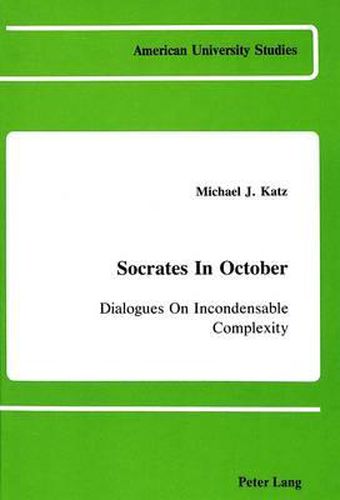Socrates in October: Dialogues on Incondensable Complexity
Michael Jay Katz

Socrates in October: Dialogues on Incondensable Complexity
Michael Jay Katz
Socrates has come to represent the pure joy of intellectual inquiry, and the Socratic dialogue embodies a special style of logical inquiry and also a clear framework of philosophical information. The intellectual grandfather of Plato’s student Aristotle, Socrates still lived at a time when the distinctions between physical science and psychology, linguistics and aesthetics, mathematics and rhetoric were not rigid fences: all philosophical attacks were fair weaponry when trying to understand a problem. In 399 B.C., philosophers could not blithely speak in the language of modern science - using space-time continua or four dimensions or relativistic frames of reference or genetic codes to hide innumerable elemental assumptions about the nature of human understanding. Moreover, Socratic philosophy was always centered around people. Instead of a dense constructure of interlaced and multilayered scientific concepts, Socrates had only his hands and his feet, and the trees, the houses, the mountains, and all the people in the Agora, the marketplace of Athens. Michael Katz has taken advantage of Socrates’ world - his style, his perspective, his times, and some of his important themes - to explore the perpetual problem of complexity: Is our world incondensably complex? If so - where and why? And, what does this mean for the kinds of understandings with which we must be satisfied?
This item is not currently in-stock. It can be ordered online and is expected to ship in approx 4 weeks
Our stock data is updated periodically, and availability may change throughout the day for in-demand items. Please call the relevant shop for the most current stock information. Prices are subject to change without notice.
Sign in or become a Readings Member to add this title to a wishlist.


